Project Year
2009
Region(s)
Latin America and the Caribbean
Country(ies)
Paraguay
Project Description
This dissertation project examines the relationship in social practice between forms of commercial capitalism and microcredit based economic development in Paraguay’s free trade zone of Ciudad del Este. This project is an effort to triangulate the modes of social regulation that produce forms of obligation and attachment through debt instruments as well as the modes of social differentiation that separate and distinguish different forms of credit in Ciudad del Este for businesses that face pervasive economic exclusion.
Researcher(s)
Caroline Schuster
About the Researcher(s)
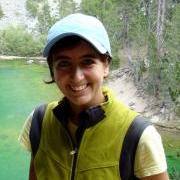
Synopsis of Research Results
This research project is an ethnographic investigation of a microcredit-based development initiative in Ciudad del Este, a commercial “special customs zone” on Paraguay’s triple-frontier with Brazil and Argentina. As a border town, much of the economic activity in Ciudad del Este is based on cross-border trade. I began this project with an interest in how development projects that aim at financial inclusion operate in a city already configured by extensive commercial activity: even marginal neighborhoods in Ciudad del Este are caught up in the financial flows of cross-border trade and petty arbitrage. If the microfinance Non-Government Organization (NGO)— Fundación Paraguaya —is working through solidarity loans to foster entrepreneurship in its committees of women entrepreneurs, how is the institutional notion of entrepreneurship similar to or different from the lived-experience of commerce in the ‘special customs zone?’ How does microcredit-based development fit into the many small-scale credit options available in Ciudad del Este?
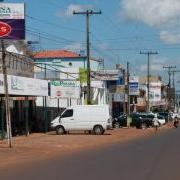
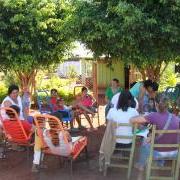
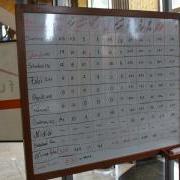 f credit and development initiatives both are an effort in some sense to ‘see into
the future,’ how do the obligations produced by microfinance reflect both the predictability and rigor imposed by the financial technology [with its intransigent
payment schedule and cyclical scaling-up of both credit and savings], as well as the
uncertainties of the ‘solidarities’ imposed by joint-borrowing? My research engages
with the many modalities of credit and debt that organize daily economic life in Ciudad
del Este and the sites of authority that produce and (or foreclose) those relationships
of credit and repayment (or non-payment). Microcredit is surely not the only source
of credit for poor women working in the informal economy on the border. Microfinance
borrowers often pay for home appliances on installment plans, pay a monthly quota
for their land parcel, have a tab at the local grocery shop, and have multiple small
loans with both formal and informal lenders. The authority to lend as well as to borrow,
and the power to speed up or slow down payment or repayment are all economic processes;
they hinge in part on what might be broadly glossed as ‘market mechanisms,’ but also
are caught up with the micropolitics of kinship and neighborhood, as well as national
concerns like Paraguay’s wide-reaching credit check service, panoply currency exchange
rates (especially on the border), and national banking laws and regulations.
f credit and development initiatives both are an effort in some sense to ‘see into
the future,’ how do the obligations produced by microfinance reflect both the predictability and rigor imposed by the financial technology [with its intransigent
payment schedule and cyclical scaling-up of both credit and savings], as well as the
uncertainties of the ‘solidarities’ imposed by joint-borrowing? My research engages
with the many modalities of credit and debt that organize daily economic life in Ciudad
del Este and the sites of authority that produce and (or foreclose) those relationships
of credit and repayment (or non-payment). Microcredit is surely not the only source
of credit for poor women working in the informal economy on the border. Microfinance
borrowers often pay for home appliances on installment plans, pay a monthly quota
for their land parcel, have a tab at the local grocery shop, and have multiple small
loans with both formal and informal lenders. The authority to lend as well as to borrow,
and the power to speed up or slow down payment or repayment are all economic processes;
they hinge in part on what might be broadly glossed as ‘market mechanisms,’ but also
are caught up with the micropolitics of kinship and neighborhood, as well as national
concerns like Paraguay’s wide-reaching credit check service, panoply currency exchange
rates (especially on the border), and national banking laws and regulations.
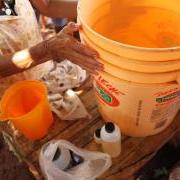 Microcredit is a particular instance of credit, used in the case of Fundación Paraguaya to promote “committees of women entrepreneurs.” How, then, does “entrepreneurship”
fit in with the question of (1) credit [especially credit directed at poor women]
and (2) commerce? How do the cycles of time/(logics/rigors/payment structures) within
microcredit structure commercial relations within the group, and connect the group
to other socially meaningful individuals or collectivities? “Committees” are very
good at mobilizing kin and neighbor relations to capture and accumulate value in order
to repay loans to the microcredit organization (via neighborhood raffles, bake sales,
parties, &c). What does this mean for the circulation of wealth within a “solidarity
group”, if it is constantly sustained by the influx of monies from relationships that
span and connect the committee to other social groupings? And how might these linkages
relate to ideas about “entrepreneurial” activity?
Microcredit is a particular instance of credit, used in the case of Fundación Paraguaya to promote “committees of women entrepreneurs.” How, then, does “entrepreneurship”
fit in with the question of (1) credit [especially credit directed at poor women]
and (2) commerce? How do the cycles of time/(logics/rigors/payment structures) within
microcredit structure commercial relations within the group, and connect the group
to other socially meaningful individuals or collectivities? “Committees” are very
good at mobilizing kin and neighbor relations to capture and accumulate value in order
to repay loans to the microcredit organization (via neighborhood raffles, bake sales,
parties, &c). What does this mean for the circulation of wealth within a “solidarity
group”, if it is constantly sustained by the influx of monies from relationships that
span and connect the committee to other social groupings? And how might these linkages
relate to ideas about “entrepreneurial” activity?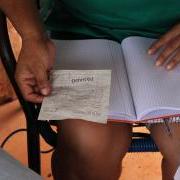 This project is an attempt to track the many sites of social obligation that regulate
economic activity. This is especially important for highly regulated microcredit-based
development projects, which, at first glance, might seem like a unique case with few
similarities to ‘normal’ markets and economies. However, I would like to argue that
the solidarities (or lack thereof) that configure microfinance are not all that different
from the questions of authority, temporality, risk and value at the heart of credit
relationships generally. Development projects with a mission of poverty alleviation
share many affinities with the aspirations, hopes and fears that lead us to anticipate
economic outcomes and plan for our financial future. Living on credit is a reminder
that few economic processes are merely transactions based on a one-time exchange,
but rather involve complicated relationships built over time and including many intercalated
obligations and responsibilities. In Ciudad del Este, a city with a commercial economy
where value and price are indeed often equivalent (as neo-classical economists postulate),
the instances of non-equivalence—where multiple values are at play and often inconvertible
or non-transferable across circuits of relationships—are particularly telling.
This project is an attempt to track the many sites of social obligation that regulate
economic activity. This is especially important for highly regulated microcredit-based
development projects, which, at first glance, might seem like a unique case with few
similarities to ‘normal’ markets and economies. However, I would like to argue that
the solidarities (or lack thereof) that configure microfinance are not all that different
from the questions of authority, temporality, risk and value at the heart of credit
relationships generally. Development projects with a mission of poverty alleviation
share many affinities with the aspirations, hopes and fears that lead us to anticipate
economic outcomes and plan for our financial future. Living on credit is a reminder
that few economic processes are merely transactions based on a one-time exchange,
but rather involve complicated relationships built over time and including many intercalated
obligations and responsibilities. In Ciudad del Este, a city with a commercial economy
where value and price are indeed often equivalent (as neo-classical economists postulate),
the instances of non-equivalence—where multiple values are at play and often inconvertible
or non-transferable across circuits of relationships—are particularly telling.



